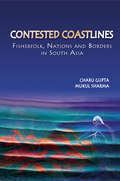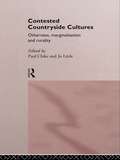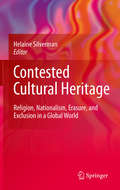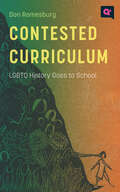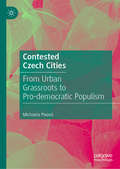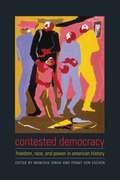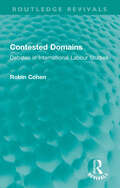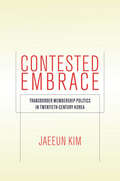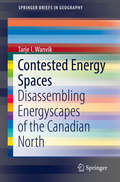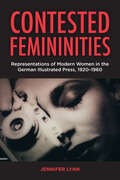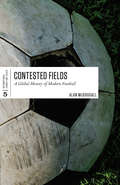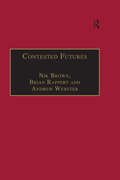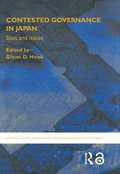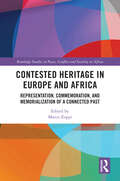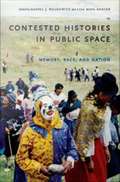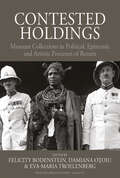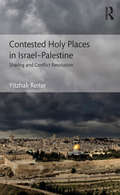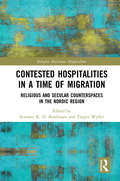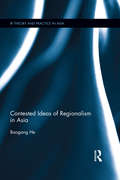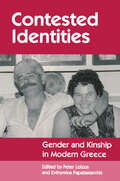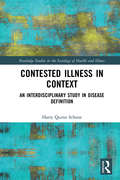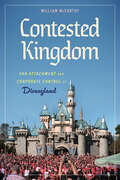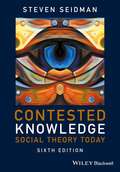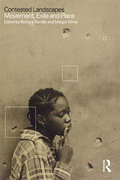- Table View
- List View
Contested Coastlines: Fisherfolk, Nations and Borders in South Asia
by Charu Gupta Mukul SharmaThis book is about the tragic journeys and livelihood insecurities of coastal fisherfolk jailed by India, Pakistan, Sri Lanka and Bangladesh for having entered each other’s territorial waters. While reflecting on national anxieties and the deleterious politics of boundaries, it reveals how these fisherfolk create alternative maps and a new world of ‘debordering’. These fishworkers and coastal conflicts have been subjects of everyday news, but never a subject of serious study. A first of its kind, the present book breaks new ground by examining the journeys of these fisherfolk and coastal conflicts in South Asia from several overlapping but distinct perspectives: declining sea resources, security and border anxieties, suffering of the fisherfolk, their ambiguous identities and transnational movements. The book is also innovative in terms of methodology: it is fisherfolk-centric as it marginalizes the concerns of the state from the perspective of security; it questions the very basis of security and argues for a shift in its perspective.
Contested Countryside Cultures: Rurality and Socio-cultural Marginalisation
by Paul Cloke Jo LittleThis book examines the 'other' side of the countryside, a place also inhabited (and visited) by women, children, teenagers, the elderly, gay men and lesbians, black and ethnic minorities, the unemployed and the poor. These groups have remained largely excluded by both rural policies and the representations of rural culture. The book charts the experiences of these marginalised groups and sets this exploration within the context of postmodern, poststructuralist, postcolonial and late feminist analysis. This theoretical framework reveals how notions of the rural have been created to reflect and reinforce divisions amongst those living in the countryside.
Contested Cultural: Religion, Nationalism, Erasure, and Exclusion in a Global World
by Helaine SilvermanCultural heritage is material - tangible and intangible - that signifies a culture's history or legacy. It has become a venue for contestation, ranging in scale from protesting to violently claimed and destroyed. But who defines what is to be preserved and what is to be erased? As cultural heritage becomes increasingly significant across the world, the number of issues for critical analysis and, hopefully, mediation, arise. The issue stems from various groups: religious, ethnic, national, political, and others come together to claim, appropriate, use, exclude, or erase markers and manifestations of their own and others' cultural heritage as a means for asserting, defending, or denying critical claims to power, land, and legitimacy. Can cultural heritage be well managed and promoted while at the same time kept within parameters so as to diminish contestation? The cases herein rage from Greece, Spain, Egypt, the UK, Syria, Zimbabwe, Italy, the Balkans, Bénin, and Central America.
Contested Curriculum: LGBTQ History Goes to School (Q+ Public)
by Don RomesburgToday, many states have proposed so-called “Don’t Say Gay” bills that prohibit public school teachers from mentioning LGBTQ topics in the classroom. But a few states, like California, have taken decisive steps in the other direction. They mandate inclusive education that treats LGBTQ history as essential to the curriculum. At once a history of an evolving movement and an activist handbook, Contested Curriculum navigates the rocky path to LGBTQ-inclusive K–12 history education in the United States and recounts the fight for a curriculum that recognizes the value of queer and trans lives. What began in fits and starts in activism and educational materials across the late twentieth century led to the passage of California’s landmark FAIR Education Act in 2011, ensuring that LGBTQ history has a place in the K–12 classroom. Historian Don Romesburg, the lead scholar who worked with advocacy organizations to pass the act, recounts the decades-long struggle to integrate LGBTQ content into history education policy, textbooks, and classrooms. Looking at California and states that followed its lead, he assesses the challenges and opportunities presented by this new way of teaching history. Romesburg’s powerful case for LGBTQ-inclusive education is all the more urgent in this era of anti-gay book bans, regressive legislation, and attempts to diminish the vital role that inclusive and honest history education should play in a democratic nation.
Contested Czech Cities: From Urban Grassroots to Pro-democratic Populism
by Michaela PixováThis book focuses on urban grassroots movements in post-socialist Czechia and their struggle against unprofessional and nondemocratic urban processes in their cities. It shows that in the context of neoliberal urban restructuring, weakly consolidated democracy, and corporate capture of the local state, urban activists often resort to entering electoral competition as the only efficient way of improving the situation in their cities. The book is based on four case studies from different Czech cities, narrating stories of activists struggling against a controversial flood protection project, the demolition of public buildings, an unhealthy land-use plan, arrogant development, and overpriced city halls. It offers valuable insight into the obstacles created by institutionalized forms of power abuse which urban activists must deal with and discusses the pro-democratic potential of urban grassroot movements’ efforts to overcome their limited ability to influence political processes via standard means of civic engagement and protest activities.
Contested Democracy: Freedom, Race, and Power in American History
by Sinha Manisha Penny Von Eschen Eds.With essays on U.S. history ranging from the American Revolution to the dawn of the twenty-first century, Contested Democracy illuminates struggles waged over freedom and citizenship throughout the American past. Guided by a commitment to democratic citizenship and responsible scholarship, the contributors to this volume insist that rigorous engagement with history is essential to a vital democracy, particularly amid the current erosion of human rights and civil liberties within the United States and abroad. Emphasizing the contradictory ways in which freedom has developed within the United States and in the exercise of American power abroad, these essays probe challenges to American democracy through conflicts shaped by race, slavery, gender, citizenship, political economy, immigration, law, empire, and the idea of the nation state. In this volume, writers demonstrate how opposition to the expansion of democracy has shaped the American tradition as much as movements for social and political change. By foregrounding those who have been marginalized in U.S society as well as the powerful, these historians and scholars argue for an alternative vision of American freedom that confronts the limitations, failings, and contradictions of U.S. power. Their work provides crucial insight into the role of the United States in this latest age of American empire and the importance of different and oppositional visions of American democracy and freedom. At a time of intense disillusionment with U.S. politics and of increasing awareness of the costs of empire, these contributors argue that responsible historical scholarship can challenge the blatant manipulation of discourses on freedom. They call for careful and conscientious scholarship not only to illuminate contemporary problems but also to act as a bulwark against mythmaking in the service of cynical political ends.
Contested Domains: Debates in International Labour Studies
by Robin CohenOriginally published in 1991, this volume discusses the urban working class, international migrants and the so-called lumpenproletariat. The book exhibits the fruitful interaction that has taken place between sociological theory, new views of the changing world economy and the empirical realities of working class experience and struggles. The dual theme of the book is the control which the state and employers seek to impose and maintain over labouring people, and the resistance put up by workers to these often new and unacceptable disciplines. With case studies – both historical and contemporary – drawn from North America, Britain and various parts of Africa, the author develops an interlocking theory of habituation and resistance. Against the background of profound changes in the global economy, Robin Cohen explores ways in which labouring people respond to the structural and managerial constrains on the development of their class consciousness and self-organisation. This will be of interest to urban and industrial sociologists, as well as those concerned with comparative social theory and the relationship between developing world and industrialised societies.
Contested Embrace: Transborder Membership Politics in Twentieth-Century Korea
by Jaeeun KimScholars have long examined the relationship between nation-states and their "internal others," such as immigrants and ethno-racial minorities. Contested Embrace shifts the analytic focus to explore how a state relates to people it views as "external members" such as emigrants and diasporas. Specifically, Jaeeun Kim analyzes disputes over the belonging of Koreans in Japan and China, focusing on their contested relationship with the colonial and postcolonial states in the Korean peninsula. Extending the constructivist approach to nationalisms and the culturalist view of the modern state to a transnational context, Contested Embrace illuminates the political and bureaucratic construction of ethno-national populations beyond the territorial boundary of the state. Through a comparative analysis of transborder membership politics in the colonial, Cold War, and post-Cold War periods, the book shows how the configuration of geopolitics, bureaucratic techniques, and actors' agency shapes the making, unmaking, and remaking of transborder ties. Kim demonstrates that being a "homeland" state or a member of the "transborder nation" is a precarious, arduous, and revocable political achievement.
Contested Energy Spaces: Disassembling Energyscapes of the Canadian North (SpringerBriefs in Geography)
by Tarje I. WanvikThis authored brief discusses how to conceptualize the socio-material complexity of contested energy spaces in the Canadian North, specifically in the context of indigenous communities that have allowed industrial developments to occur on their lands despite the environmental and lifestyle consequences. By applying assemblage theory, the author identifies contested energy spaces as complex places or situations that need to be understood through geographical concepts of place, scale, and power. In 6 chapters, the book challenges preconceptions of indigenous peoples as victims by examining communities that favor industrial developments, and identifies instabilities in the Canadian North to analyze the power relations between industry, state and indigenous communities. The book will be of interest to undergraduate and graduate students, teachers and lecturers, and geography scholars.Chapter 1 introduces the concept of energy spaces, and addresses the main research question posed in the text; why do some indigenous communities support extractive industry developments on their traditional territories, despite substantial destruction of the local environment and traditional indigenous land use practices? Chapter 2 further elaborates on the conceptualization of contested energy spaces, and chapter 3 applies this to the study area in Alberta, Canada. Chapter 4 discusses the methodology of the research process, and chapter 5 presents empirical cases in Alberta, from the changing governance structures of energy spaces to the networking of local indigenous communities. Chapter 6 concludes the brief by summarizing he findings, and by offering advice to all stakeholders regarding the dangers of leaving government processes to market forces alone.
Contested Femininities: Representations of Modern Women in the German Illustrated Press, 1920-1960
by Jennifer LynnIn this comprehensive, long-view study on the concept of the Neue or Moderne Frau (New or Modern Woman) that spans the Weimar Republic, Third Reich, post-war period, and a divided Germany, Contested Femininities explores how different political and social groups constructed images of women to present competing visions of the future. It takes the highly contested representations of women presented in the illustrated press and examines how they emerged as crucial markers of modernity. In doing so it reveals the surprising continuity of these images across political periods and reflects on how debates over paid work, the gender division of labor in the household, the politics of the body, and consumption, played a central role in how different German regimes defined the Modern Woman.
Contested Fields: A Global History of Modern Football (International Themes and Issues)
by Alan McDougallFew cultural activities speak more powerfully to international histories of the modern world than football. In the late nineteenth century, this cheap and simple sport emerged as a major legacy of Britain’s formal and informal empires and spread quickly across Europe, South America, and Africa. More slowly and hesitantly, it made inroads into the sports cultures of North America and Australasia. Today, football (known to many as soccer) is arguably the world’s most popular pastime, an activity played and watched by millions of people around the globe. It has also become the focus of a rich and diverse body of scholarly research. Contested Fields introduces readers to key aspects of the global game, synthesizing research on football’s transnational role in reflecting and shaping political, socio-economic, and cultural developments over the past 150 years. Each chapter uses case studies and cutting-edge scholarship to analyze an important element of football’s international story: migration, money, competition, gender, race, space, spectatorship, and confrontation.
Contested Futures: A Sociology of Prospective Techno-Science
by Nik Brown Brian RappertIn a unique volume, Contested Futures brings together a group of scholars to examine the relationships between social action and the future. Rather than speculating upon what the future might bring, the volume interrogates the metaphors and practices through which the future is mobilized as an object of present day action and agency. The book shifts the analytical gaze from looking into the future to looking at the future as a sociological phenomenon in its own right. Futures are thus contested in as much as they register differences of interest, time frame or organizational and political form. Contestation is also evident in the ascendancy of certain discourses, languages and metaphors which foreclose some futures whilst facilitating others. But futures are far from being simply linguistic abstractions, and in fact can often be seen to harden into material entrenchment as expectations become scripted into 'path dependency' and 'lock in'. Contested Futures is an invaluable analysis for both academics and policy actors seeking a better understanding of the ubiquity of futures-discourse in the context of today’s uncertainties.
Contested Governance in Japan: Sites and Issues (The University of Sheffield/Routledge Japanese Studies Series)
by Glenn HookContested Governance in Japan extends the analysis of governance in contemporary Japan by exploring both the sites and issues of governance above and below the state as well as within it. This volume discusses the contested nature of governance in Japan and the ways in which a range of actors are involved in different sites and issues of governance at home, in the region and the globe. It includes chapters on global governance, local policy-making, democracy, environmental governance, the Japanese financial system, corruption, the family and corporate governance.
Contested Heritage in Europe and Africa: Representation, Commemoration, and Memorialization of a Connected Past (Routledge Studies in the Modern History of Africa)
by Marco ZoppiThis book investigates Euro-African cultural relations, considering their connected histories through material and immaterial forms of representation, commemoration, and memorialization. Recent waves of protest around the world have called for restitution of looted African art, and toppled statues and vandalized monuments which are connected to white suprematism, colonialism, and imperialism. These events have highlighted an urgent need to debate the management and preservation of Europe and Africa’s shared heritage. Drawing on a range of varied, trans-continental case studies, this book considers the key question of whether such monuments should be removed as forms of unacceptable celebration of an evil past, or preserved precisely because of what they recount about that past of oppression and domination. The book encourages readers to consider how diverse and pervasive the notions of shared heritage and common past are, encompassing discussions of statues, exhibitions, graffiti, tapestries, and commemorations. Providing a timely analysis of the developing cultural relations between Africa and Europe, this book will be an important resource for researchers across the fields of global history, heritage studies, memory studies, and international relations.
Contested Histories in Public Space: Memory, Race, and Nation
by Daniel J. Walkowitz Lisa Maya KnauerContested Histories in Public Space brings multiple perspectives to bear on historical narratives presented to the public in museums, monuments, texts, and festivals around the world, from Paris to Kathmandu, from the Mexican state of Oaxaca to the waterfront of Wellington, New Zealand. Paying particular attention to how race and empire are implicated in the creation and display of national narratives, the contributing historians, anthropologists, and other scholars delve into representations of contested histories at such "sites" as a British Library exhibition on the East India Company, a Rio de Janeiro shantytown known as "the cradle of samba," the Ellis Island immigration museum, and high-school history textbooks in Ecuador. Several contributors examine how the experiences of indigenous groups and the imperial past are incorporated into public histories in British Commonwealth nations: in Te Papa, New Zealand's national museum; in the First Peoples' Hall at the Canadian Museum of Civilization; and, more broadly, in late-twentieth-century Australian culture. Still others focus on the role of governments in mediating contested racialized histories: for example, the post-apartheid history of South Africa's Voortrekker Monument, originally designed as a tribute to the Voortrekkers who colonized the country's interior. Among several essays describing how national narratives have been challenged are pieces on a dispute over how to represent Nepali history and identity, on representations of Afrocuban religions in contemporary Cuba, and on the installation in the French Pantheon in Paris of a plaque honoring Louis Delgrs, a leader of Guadeloupean resistance to French colonialism. Contributors. Paul Amar, Paul Ashton, O. Hugo Benavides, Laurent Dubois, Richard Flores, Durba Ghosh, Albert Grundlingh, Paula Hamilton, Lisa Maya Knauer, Charlotte Macdonald, Mark Salber Phillips, Ruth B. Phillips, Deborah Poole, Anne M. Rademacher, Daniel J. Walkowitz
Contested Holdings: Museum Collections in Political, Epistemic and Artistic Processes of Return (Museums and Collections #14)
by Eva-Maria Troelenberg Felicity Bodenstein, Damiana OţoiuGoing beyond strictly legal and property-oriented aspects of the restitution debate, restitution is considered as part of a larger set of processes of return that affect museums and collections, as well as notions of heritage and object status. Covering a range of case studies and a global geography, the authors aim to historicize and bring depth to contemporary debates in relation to both the return of material culture and human remains. Defined as contested holdings, differing museum collections ranging from fine arts to physical anthropology provide connections between the treatment and conceptualization of collections that generally occupy separate realms in the museum world.
Contested Holy Places in Israel–Palestine: Sharing and Conflict Resolution
by Yitzhak ReiterOver the last twenty years, there has been a growing understanding that conflicts in or over holy places differ from other territorial conflicts. A holy site has a profound meaning, involving human beliefs, strong emotions, "sacred" values, and core identity self-perceptions; therefore a dispute over such land differs from a "regular" dispute over land. In order to resolve conflicts over holy sites, one must be equipped with an understanding of the cultural, religious, social, and political meaning of the holy place to each of the contesting groups. This book seeks to understand the many facets of disputes and the triggers for the outbreak of violence in and around holy sites. It analyses fourteen case studies of conflicts over holy sites in Palestine/Israel, including major holy sites such as Al-Haram al-Sharif/the Temple Mount, the Western Wall and the Cave of the Patriarchs/Al-Ibrahimi Mosque in Hebron, in addition to disputes over more minor sites. It then compares these conflicts to similar cases from other regions and provides an analysis of effective and ineffective conflict mitigation and resolution tools used for dealing with such disputes. Furthermore, the book sheds light on the role of sacred sites in exacerbating local and regional ethnic conflicts. By providing a thorough and systematic analysis of the social, economic, and political conditions that fuel conflicts over holy sites and the conditions that create tolerance or conflict, this book will be a key resource for students and scholars of conflict resolution, political science, and religious studies.
Contested Hospitalities in a Time of Migration: Religious and Secular Counterspaces in the Nordic Region (Religion, Resistance, Hospitalities)
by Synnøve K. N. Bendixsen Trygve WyllerThis book explores the duality of openness and restriction in approaches to migrants in the Nordic countries. As borders have become less permeable to non-Europeans, it presents research on civil society practices that oppose the existing border regimes and examine the values that they express. The volume offers case studies from across the region that demonstrate opposition to increasingly restricted borders and which seek to offer hospitality to migrant. One topic is whether these practices impact and transform the Nordic Protestant trajectory. The book considers whether such actions are indicative of new sensibilities and values in which traditional categories and binaries are becoming less relevant. It also discusses what these practices of hospitality indicate about the changing relationship between voluntary organizations and the Nordic welfare states in the time of migration. As such, it will appeal to scholars of sociology, anthropology, and religious studies with interests in migration, civil society resistance and social values.
Contested Ideas of Regionalism in Asia (IR Theory and Practice in Asia)
by Baogang HeDeepening regionalism in Asia demands new leadership. Strong elites who are committed to a supranational identity are a minimum requirement of successful regionalism. Regional leaders are increasingly seen as a new set of leaders in Europe. Currently, Asian regional leaders largely come from the diplomacy community, or trade and economic sectors. Yet further regionalization demands a new type of leadership from civil society and citizens. In this context it is important to cultivate new regional leadership through the development of regional citizenship. This book examines contested ideas of regionalism in Asia with a particular focus on two competing ideas of pan-Asianism and Pacificism. It also identifies a new trend and contestation, the fundamental shift from a civilization understanding of regionalism to a technocratic and functional understanding of regionalism in the form of regulatory regionalism. It also examines the other contested imaginations of regionalism in Asia including elitist versus participatory approaches to regionalism, and democracy-centric versus nationalism-centric approaches to regionalism.
Contested Identities: Gender and Kinship in Modern Greece (Princeton Modern Greek Studies #37)
by Peter Loizos and Evthymios PapataxiarchisIn this collection leading anthropologists provide a comprehensive yet highly nuanced view of what it means to be a Greek man or woman, married or unmarried, functioning within a complex society based on kinship ties. Exploring the ways in which sexual identity is constructed, these authors discuss, for example, how going out for coffee embodies dominant ideas about female sexuality, moral virtue, and autonomy; why men in a Lesbos village maintain elaborate friendships with nonfamily members while the women do not; why young housewives often participate in conflict-resolution rituals; and how the dominant role of mature married householders is challenged by unmarried persons who emphasize spontaneity and personal autonomy. This collection demonstrates that kinship and gender identities in Greece are not unitary and fixed: kinship is organized in several highly specific forms, and gender identities are plural, competing, antagonistic, and are continually being redefined by contexts and social change.
Contested Illness in Context: An Interdisciplinary Study in Disease Definition
by Harry Quinn SchoneWhat makes a disease real? Why is it that patients with chronic fatigue syndrome or fibromyalgia are doubted when they say they are in pain, and cannot access the same benefits of patient-hood that others can? What defines the limits of our belief and, ultimately, compassion, when it comes to disease? These are the questions approached in this book, which draws upon patients’ experiences and situates them among a diverse set of literatures, from the history and philosophy of medicine to the sociology of health and disease. The question of a patient’s identity and their understanding of disease is often assumed to emerge from their relationship with healthcare, but the case is made here that other, inter-personal factors are more salient. What a patient with a contested illness comes up against is not simply a medical categorisation – it is a prevailing notion of disease across society, and one they struggle to assimilate themselves into. Contested Illness in Context will appeal to students and researchers interested in fields such as the history and philosophy of medicine, the sociology of health and illness, medical anthropology, or disease and illness generally. It may also interest patients and doctors who struggle with difficult medical cases.
Contested Kingdom: Fan Attachment and Corporate Control at Disneyland
by William McCarthyIn Contested Kingdom: Fan Attachment and Corporate Control at Disneyland, William McCarthy presents a groundbreaking study centered on the history of Disneyland and Disney theme park enthusiasts. Focusing on two unexplored yet interconnected phenomena—the dynamic relationship between the Disney corporation and Southern Californian fans in both online and physical park settings over a span of more than three decades—this volume sheds new light on the meaning and purpose of Disneyland. Through a comprehensive analysis of the interwoven dimensions of individuals, place, and cognitive, affective, and behavioral processes, McCarthy explores the fervent sense of place attachment experienced by the approximately one million annual passholders who visit the park. McCarthy’s analysis extends beyond the physical world of Disneyland by delving into the evolution of Disney fandom, discourse, commerce, and social formations in online social platforms like Usenet, web discussion boards, and social media. By employing a mixed-methods approach incorporating interviews, participant observation, surveys, and data analysis, this study establishes a novel analytical framework for comprehending the interrelationships between the Disney corporation, its fan communities, and online social platforms. As the first in-depth longitudinal analysis of the ongoing struggle on successive social platforms between fan users and a corporate entity, Contested Kingdom provides valuable insights for scholars and future investigations.
Contested Knowledge: Social Theory Today
by Steven SeidmanIn the sixth edition of Contested Knowledge, social theorist Steven Seidman presents the latest topics in social theory and addresses the current shift of 'universalist theorists' to networks of clustered debates. Responds to current issues, debates, and new social movements Reviews sociological theory from a contemporary perspective Reveals how the universal theorist and the era of rival schools has been replaced by networks of clustered debates that are relatively 'autonomous' and interdisciplinary Features updates and in-depth discussions of the newest clustered debates in social theory—intimacy, postcolonial nationalism, and the concept of 'the other' Challenges social scientists to renew their commitment to the important moral and political role social knowledge plays in public life
Contested Landscapes: Movement, Exile and Place
by Barbara Bender Margot WinerLandscapes are not just backdrops to human action; people make them and are made by them. How people understand and engage with their material world depends upon particularities of time and place. These understandings are dynamic, variable, contradictory and open-ended. Landscapes are thus always evolving and are often volatile and contested. They are also always on the move - people may or may not be rooted, but they have 'legs'. From prehistoric times onwards people have travelled, but the process of people-on-the-move - as tourists, or on global business, as migrant workers or political or economic refugees - has vastly accelerated. How and why do people who share the same landscape have different and often violently opposed ways of understanding its significance? How do people-on-the-move make sense of the unfamiliar? How do they create a sense of place? How do they rework the memories of places left behind? There is nothing easeful about the landscapes discussed in this book, which are often harsh-edged and troubled both socially and politically. The contributors tackle contested notions of landscape to explain the key role it plays in creating identity and shaping human behaviour. This landmark study offers an important contribution towards an understanding of the complexity of landscape.
Contested Learning in Welfare Work
by Peter H. SawchukDrawing on the field of cultural historical psychology and the sociologies of skill and labour process, Contested Learning in Welfare Work offers a detailed account of the learning lives of state welfare workers in Canada as they cope, accommodate, resist and flounder in times of heightened austerity. Documented through in-depth qualitative and quantitative analysis, Peter Sawchuk shows how the labour process changes workers, and how workers change the labour process, under the pressures of intensified economic conditions, new technologies, changing relations of space and time, and a high-tech version of Taylorism. Sawchuk traces these experiences over a seven-year period that includes major work reorganisation and the recent economic downturn. His analysis examines the dynamics between notions of de-skilling, re-skilling and up-skilling, as workers negotiate occupational learning and changing identities.
